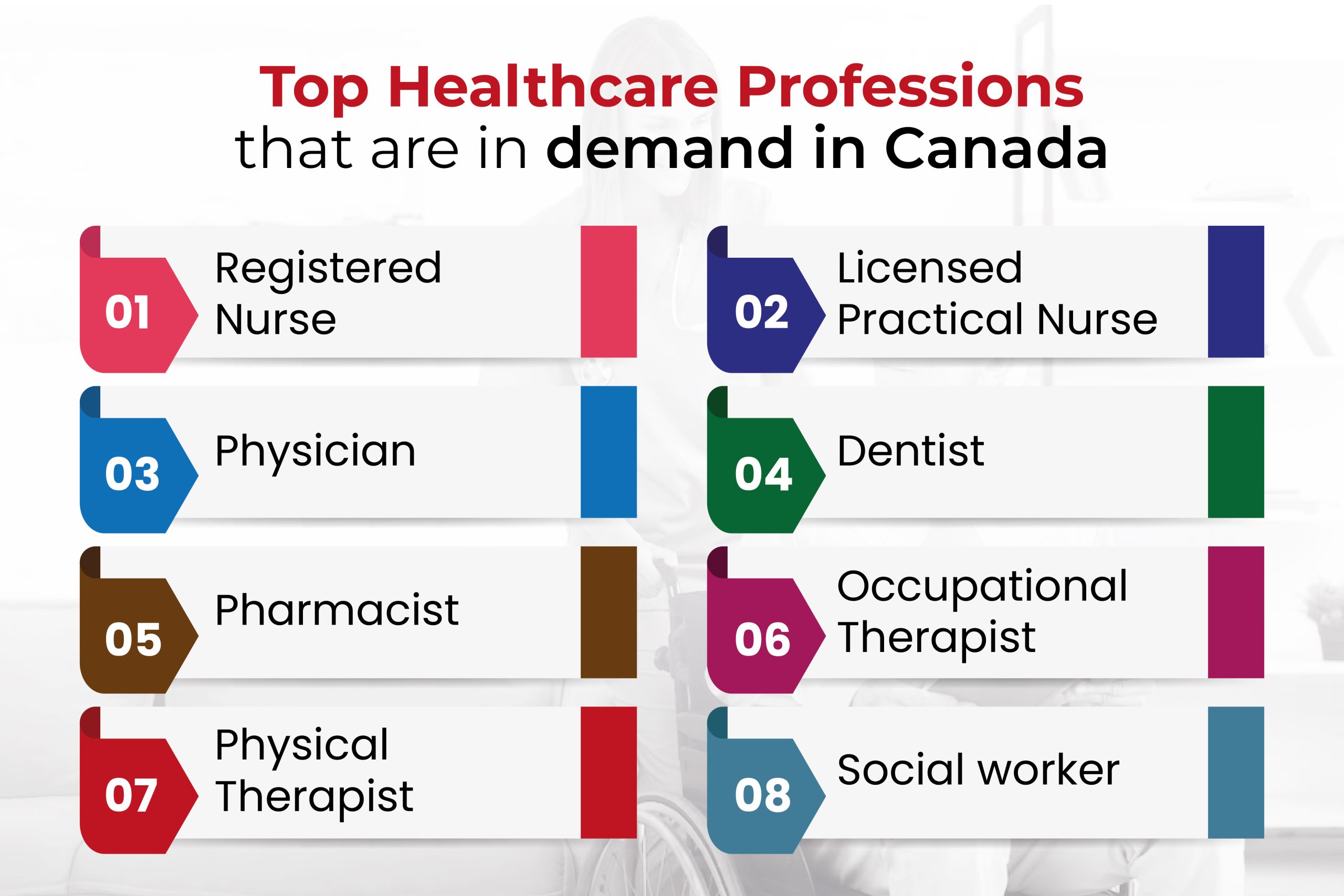Canada relies heavily on immigration to fill the vacancies in the healthcare system. A recent census on the immigration population in Canada noted that a quarter of registered nurses and 36% of physicians in Canada were foreign-born.
To further augment the immigration of foreign-trained healthcare workers, Canada will now hold category-wise Express Entry draws. Here, IRCC will invite the highest-ranking candidates who have a high proficiency in French, or who have work experience in any of the following areas:
1. Healthcare
2. Science, technology, engineering, and mathematics (STEM) professions
3. Trades, such as carpenters, plumbers, and contractors
4. Transport
5. Agriculture and agri-food
We have already covered the available Canadian immigration options for the in-demand field: STEM here. Continue further to learn about available options for healthcare workers looking to immigrate to Canada.
Top Healthcare Occupations for Immigrants in Canada
Here are some of the many healthcare occupations that are in demand in Canada. If you are a qualified healthcare worker, you may be able to immigrate to Canada and find a rewarding career in healthcare.
1. Registered Nurse (RN): RNs are responsible for providing direct patient care, such as administering medications, monitoring vital signs, and providing wound care. They work in a variety of settings, including hospitals, clinics, and long-term care facilities.
2. Licensed Practical Nurse (LPN): LPNs provide similar care to RNs, but they have less training. They work under the supervision of RNs and doctors.
3. Physician: Physicians are responsible for diagnosing and treating patients. They work in hospitals, clinics, and private practices.
4. Dentist: Dentists provide preventive and restorative dental care. They work in private practices and dental clinics.
5. Pharmacist: Pharmacists dispense medications and provide medication advice to patients. They work in pharmacies, hospitals, and clinics.
6. Occupational therapist (OT): OTs help patients recover from injuries or illnesses by helping them develop and maintain the skills they need to participate in everyday activities. They work in hospitals, clinics, and community settings.
7. Physical therapist (PT): PTs help patients recover from injuries or illnesses by helping them improve their strength, range of motion, and flexibility. They work in hospitals, clinics, and community settings.
8. Social worker: Social workers help patients and families cope with the emotional and social aspects of illness or disability. They work in hospitals, clinics, and community settings.
Job vacancies in the Healthcare and Social Assistance category
Canada is experiencing high job vacancies in the Healthcare and Social Assistance category. The stats from the fourth quarter (Q4) of 2022 noted 143,695 job vacancies in the Healthcare and Social Assistance category. The job vacancies per province were:
Ontario: 55,250
Quebec: 40, 105
British Columbia: 17,705
Alberta: 9,770
Saskatchewan: 2,955
Manitoba: 6,790
Newfoundland: 2,250
Nova Scotia: 4,780
New Brunswick: 2,630
PEI: 685
Northwest Territories: 565
Salary of Immigrants Working as Healthcare Professionals in Canada
| Healthcare Profession | Average Yearly Salary |
| Registered Nurse (RN) | $83,000 |
| Licensed Practical Nurse (LPN) | $55,000 |
| Physician | $200,000 |
| Dentist | $150,00 |
| Pharmacist | $100,000 |
| Occupational therapist (OT) | $80,000 |
| Physical therapist (PT) | $75,000 |
| Social Worker | $50,000 |
In addition to a good salary, healthcare workers in Canada also enjoy a number of other benefits, such as:
1. Free healthcare: All Canadian citizens and permanent residents are eligible for free healthcare.
2. Paid vacation and sick leave: Healthcare workers in Canada are entitled to paid vacation and sick leave.
3. Pension plan: Healthcare workers in Canada are eligible to participate in a government-sponsored pension plan.
4. Job security: The healthcare sector is a growing sector in Canada, so there is good job security for healthcare workers.
Canadian Immigration Programs for Healthcare Workers
There are a number of Canadian immigration programs that are available to foreign-trained healthcare workers. Some of the most popular programs include:
1. Express Entry: Express Entry is a points-based system that allows skilled workers to apply for permanent residency in Canada. Healthcare workers who meet the requirements can earn points for their education, work experience, language skills, and other factors.
2. Further, the inclusion of self-employed physicians holding temporary residency in Canada to qualify under Express Entry can be explored.
3. Provincial Nominee Programs (PNPs): Many provinces have their own immigration programs that allow them to nominate skilled workers for permanent residency. Healthcare workers who are interested in living and working in a particular province may be eligible to apply for a PNP.
4. The Canadian Experience Class (CEC): The CEC is a program that allows temporary foreign workers who have gained Canadian work experience to apply for permanent residency. Healthcare workers who have worked in Canada for at least one year may be eligible to apply for the CEC.
5. To be eligible for any of these programs, you must meet certain requirements, such as having a valid job offer in Canada, a certain level of education and language proficiency, and a clean criminal record.
6. You can find more information about the requirements for each program by consulting our immigration counselors. They can help you assess your eligibility for the various immigration programs and guide you through the application process.
Here are some additional tips for immigrating to Canada as a healthcare worker:
1. Get your credentials assessed: Your foreign credentials will need to be assessed by a Canadian professional organization to ensure that they are equivalent to Canadian standards.
2. Get certified: In some cases, you may also need to get certified by a provincial or territorial regulatory body.
3. Network: Networking with other healthcare professionals in Canada can help you find a job and get settled in your new country.
4. Be patient: The immigration process can be long and complex, so it’s important to be patient and persistent.
Opportunities for International Graduates Studying Healthcare Programs in Canada
Studying healthcare in Canada can be a great way to start your career in the healthcare industry.
1. First, you need to make sure that your education is equivalent to Canadian standards. You can do this by having your credentials assessed by a Canadian professional organization.
2. Second, you need to learn English or French. Both languages are spoken in Canada and are required for most healthcare jobs.
3. Third, you need to get a Canadian work permit. You can apply for a work permit after you have been accepted to a Canadian university or college.
Here are some of the opportunities available to international graduates studying healthcare programs in Canada:
1. Work in a hospital: Hospitals are always looking for qualified healthcare professionals. International graduates can find jobs in a variety of departments, such as nursing, medicine, and surgery.
2. Work in private practice: Private practices are owned and operated by individual healthcare professionals. International graduates can find jobs as doctors, dentists, or pharmacists.
3. Work in long-term care: Long-term care facilities provide care for elderly or disabled people. International graduates can find jobs as nurses, personal support workers, or recreation therapists.
4. Paid internships: Many hospitals and clinics offer paid internships to international graduates. Internships are a great way to gain experience and network with potential employers.
Start Your Free Consultation with CanApprove
Moving to Canada to work in healthcare can be a challenging but rewarding experience. Here are some of the challenges you may face:
1. Language barrier: If you do not speak English or French, you may have difficulty finding a job in healthcare. Most healthcare jobs in Canada require fluency in either English or French.
2. Credential assessment: Your foreign credentials may not be recognized in Canada. You may need to have your credentials assessed by a Canadian professional organization to ensure that they are equivalent to Canadian standards.
3. Licensure: In order to work in healthcare in Canada, you may need to be licensed by a provincial or territorial regulatory body. The requirements for licensure vary from province to province and territory to territory.
4. Compensation: Healthcare professionals in Canada are typically compensated less than healthcare professionals in other developed countries.
5. Work-life balance: Healthcare professionals in Canada often work long hours and have to deal with a lot of stress.
6. Culture shock: Moving to a new country can be a challenging experience, and it may take some time to adjust to the Canadian culture.
7. Family separation: If you have family members who are not Canadian citizens, they may not be able to join you in Canada.
Despite these challenges, there are many benefits to working in healthcare in Canada. Canada has a strong healthcare system and is constantly looking for qualified healthcare professionals.
Even though the immigration process can be long and frustrating, it’s important to be patient and persistent. Getting help from RICC-certified immigration consultants like CanApprove can help you navigate the immigration process and ensure that you meet all of the requirements.





